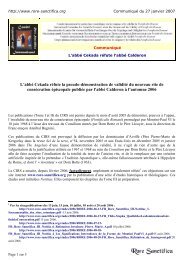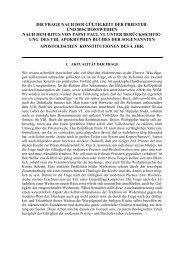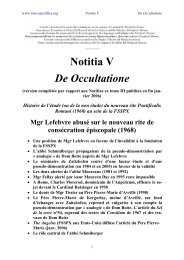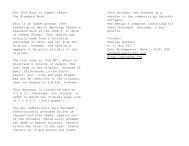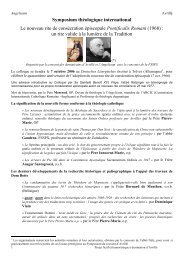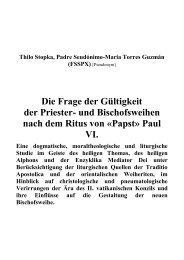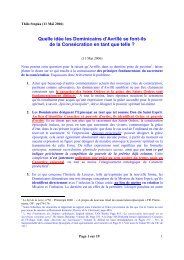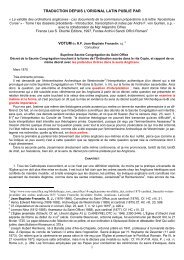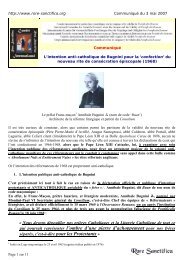THE ORDER OF MELCHISEDECH A Defence of ... - Rore Sanctifica
THE ORDER OF MELCHISEDECH A Defence of ... - Rore Sanctifica
THE ORDER OF MELCHISEDECH A Defence of ... - Rore Sanctifica
You also want an ePaper? Increase the reach of your titles
YUMPU automatically turns print PDFs into web optimized ePapers that Google loves.
Cardinal Manning was equally insistent that the manifest goodness <strong>of</strong> so many Anglicans must be<br />
attributed to the grace <strong>of</strong> God.<br />
To ascribe the good lives <strong>of</strong> such persons to the power <strong>of</strong> nature would be Pelagianism. To deny<br />
their goodness would be Jansenism. And with such a consciousness, how could anyone regard his<br />
past spiritual life in the Church <strong>of</strong> England as a mockery? I have no deeper conviction than that the<br />
grace <strong>of</strong> the Holy Spirit was with me from my earliest consciousness. Though at the time, perhaps, I<br />
knew it not as I know it now, yet I can clearly perceive the order and chain <strong>of</strong> grace by which God<br />
mercifully led me onward from childhood to the age <strong>of</strong> twenty years. 23<br />
Father Barnes explains that the Anglican sacraments can certainly be occasions <strong>of</strong> grace for those<br />
who assist at them with sincerity and devotion, quoting Newman to illustrate his point.<br />
No Catholic has any desire to deny that God may be actually giving grace today through Anglican<br />
sacraments. Why should He not? Spiritus Domini replevit orbem terrarum. "Grace is given for the<br />
merits <strong>of</strong> Christ all over the earth; there is no corner even <strong>of</strong> Paganism where it is not present,<br />
present in each heart <strong>of</strong> man in real sufficiency for his ultimate salvation. Not that the grace<br />
presented to each is sufficient to bring him at once to Heaven, but it is sufficient for a beginning. It<br />
is sufficient to enable him to plead for other grace, and that second grace is such as to impetrate a<br />
third and thus the soul may be led on from grace to grace and from strength to strength," even<br />
outside the Church. But such grace is ex opere operantis, the reward <strong>of</strong> the devotion <strong>of</strong> the<br />
individual worshipper, and is no evidence <strong>of</strong> the validity <strong>of</strong> the means which in good faith he is<br />
using. "When a member <strong>of</strong> the Establishment (Church <strong>of</strong> England) has accepted God's word that He<br />
would make Bread His Body and honoured God by the fact that he has thus accepted it, is it not<br />
suitable to God's mercy if He rewards such a special faith with a quasi sacramental grace, though<br />
the worshipper has unwittingly <strong>of</strong>fered to a material substance that adoration which he intended to<br />
pay to the present but invisible Lamb <strong>of</strong> God?" God, we must always remember, is not bound by the<br />
sacraments which He Himself has instituted-----but we are. 24<br />
In the face <strong>of</strong> the accelerating drift to neo-paganism throughout the west, every Catholic must be<br />
grateful for all that so many Anglican clerics do to uphold so much <strong>of</strong> the essential Christian faith in<br />
the face <strong>of</strong> so much discouragement, not least from the liberals within their own Communion.<br />
While we can pray that one day they will come to the fullness <strong>of</strong> truth, we can rejoice in the truth<br />
that they already embrace. But while we can rejoice in what unites us we would be failing in charity<br />
towards our Anglican brethren to gloss over what separates us-----and this is just what we would be<br />
doing if we gave the Anglo-Catholic clergy the impression that we believe they have valid orders<br />
and are sacrificing priests in the Catholic sense. Indeed, the great majority <strong>of</strong> Anglican clerics<br />
would reject with indignation any suggestion that they were sacrificing priests.<br />
1. RMP, vol. 1, pp. 448-451.<br />
2. Ibid., p. 451.<br />
3. Ibid., p. 456.<br />
4. Cranmer and the Reformation under Edward VI (Cambridge, 1926), p. 229.<br />
5. ESR, p. 204.<br />
6. Bonner's Pr<strong>of</strong>itable and necessarye doctryne (London, 1555), p. 40; cited in<br />
QAO, pp. 58/9.<br />
7. PAD, p. 21.<br />
8. T .A. Lacey, A Roman Diary and Other Documents (London, 1910), p. 8.<br />
9. PAD, pp. 23/4.<br />
10. ESR, p. 16.<br />
11. The Churchman, March 1962, pp. 23-30.<br />
12. Scottish Journal <strong>of</strong> Theology, March 1957, pp. 109-11.



